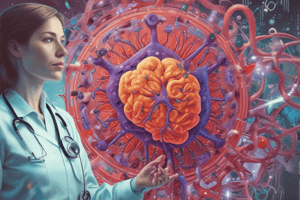Podcast
Questions and Answers
Welche Theorie schlägt verschiedene Ebenen der Motivation vor, die von physiologischen Bedürfnissen bis zur Selbstverwirklichung reichen?
Welche Theorie schlägt verschiedene Ebenen der Motivation vor, die von physiologischen Bedürfnissen bis zur Selbstverwirklichung reichen?
Was untersucht die differentielle Psychologie im Bereich der Persönlichkeitsmerkmale von Menschen?
Was untersucht die differentielle Psychologie im Bereich der Persönlichkeitsmerkmale von Menschen?
Welcher Aspekt fokussiert die Entwicklungspsychologie hauptsächlich im Zusammenhang mit Emotionsregulation?
Welcher Aspekt fokussiert die Entwicklungspsychologie hauptsächlich im Zusammenhang mit Emotionsregulation?
Was ist ein zentraler Fokus in der differentiellen Psychologie bezüglich Intelligenzunterschieden?
Was ist ein zentraler Fokus in der differentiellen Psychologie bezüglich Intelligenzunterschieden?
Signup and view all the answers
Was ist ein Hauptziel von Forschungen zur Entwicklungsdifferenzen im Bereich der Motivation?
Was ist ein Hauptziel von Forschungen zur Entwicklungsdifferenzen im Bereich der Motivation?
Signup and view all the answers
Welcher Bereich der Psychologie ist maßgeblich daran beteiligt, individuelle Unterschiede in der Entwicklung von Persönlichkeitseigenschaften zu erforschen?
Welcher Bereich der Psychologie ist maßgeblich daran beteiligt, individuelle Unterschiede in der Entwicklung von Persönlichkeitseigenschaften zu erforschen?
Signup and view all the answers
Welche der folgenden Dimensionen der Persönlichkeit beschreibt die Tendenz, offen für neue Erfahrungen und Ideen zu sein?
Welche der folgenden Dimensionen der Persönlichkeit beschreibt die Tendenz, offen für neue Erfahrungen und Ideen zu sein?
Signup and view all the answers
Welcher Aspekt der Intelligenz bezieht sich auf die Fähigkeit, neue Probleme zu lösen und sich an veränderte Situationen anzupassen?
Welcher Aspekt der Intelligenz bezieht sich auf die Fähigkeit, neue Probleme zu lösen und sich an veränderte Situationen anzupassen?
Signup and view all the answers
Welche der folgenden Emotionen wird häufig als eine der sechs Basisemotionen angesehen?
Welche der folgenden Emotionen wird häufig als eine der sechs Basisemotionen angesehen?
Signup and view all the answers
Welche Persönlichkeitseigenschaft beschreibt die Tendenz, organisiert, zuverlässig und zielstrebig zu sein?
Welche Persönlichkeitseigenschaft beschreibt die Tendenz, organisiert, zuverlässig und zielstrebig zu sein?
Signup and view all the answers
Welcher Aspekt der Intelligenz bezieht sich auf das Wissen und die Fähigkeiten, die im Laufe des Lebens erworben wurden?
Welcher Aspekt der Intelligenz bezieht sich auf das Wissen und die Fähigkeiten, die im Laufe des Lebens erworben wurden?
Signup and view all the answers
Welche Persönlichkeitseigenschaft beschreibt die Tendenz, gesellig, aufgeschlossen und energiegeladen zu sein?
Welche Persönlichkeitseigenschaft beschreibt die Tendenz, gesellig, aufgeschlossen und energiegeladen zu sein?
Signup and view all the answers
Study Notes
Differentielle Psychologie
Personality Traits
Personality refers to a set of characteristics or dispositions that define how individuals behave, think, and feel. In differentielle psychologie, the focus is on understanding individual differences in personality traits. Research has identified five major dimensions of personality, known as the Big Five traits: openness to experience, conscientiousness, extraversion, agreeableness, and neuroticism. These traits help predict how people will act, react, and interact with others.
Intelligence
Intelligence describes a complex mental ability that enables individuals to reason, problem solve, learn new skills, and adapt to their environment. Differentielle psychologie examines variations in cognitive abilities among individuals. Early theories suggested a general factor of intelligence known as g factor. However, more recent studies found cognitive abilities are best described by several distinct factors such as fluid intelligence and crystallized intelligence.
Emotions
Emotions play a crucial role in human behavior and social interactions. Differentielle psychologie seeks to understand how emotions differ between individuals and how they influence our thoughts, actions, and relationships. Research has identified six basic emotion categories: happiness, sadness, fear, anger, surprise, and disgust. These emotions are universal across cultures but may vary in intensity and expression based on individual characteristics.
Motivation
Motivation refers to the internal drive or force that propels individuals towards achieving their goals. Differentielle psychologie explores how motivation differs among people and influences various aspects of life, including academic performance, work productivity, and interpersonal relationships. Maslow's hierarchy of needs theory suggests different levels of motivations ranging from physiological needs to self-actualization.
Developmental Differences
Developmental psychology investigates changes in mental, emotional, and physical capacities throughout one's lifespan. In differentielle psychologie, this branch focuses on identifying individual differences in developmental processes. This includes studying variations in growth rates, cognitive milestones, and personality traits in children and adolescents, as well as age-related changes in intelligence, emotion regulation, and motivation.
Understanding these subtopics within differentielle psychologie provides valuable insights into individual variability and helps tailor interventions to enhance personal growth and development. It also serves as a foundation for informing educational policies and practices aimed at promoting inclusive environments for all learners.
Studying That Suits You
Use AI to generate personalized quizzes and flashcards to suit your learning preferences.
Description
Explore the key subfields in differentielle psychologie focusing on personality traits, intelligence, emotions, motivation, and developmental differences. Learn about the Big Five traits, cognitive abilities, basic emotions, motivation theories, and developmental variations across the lifespan.





